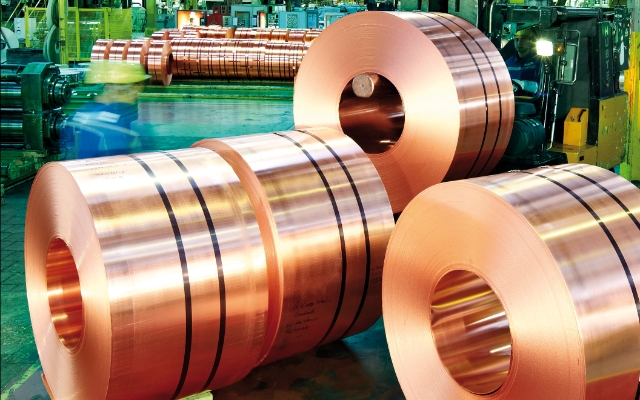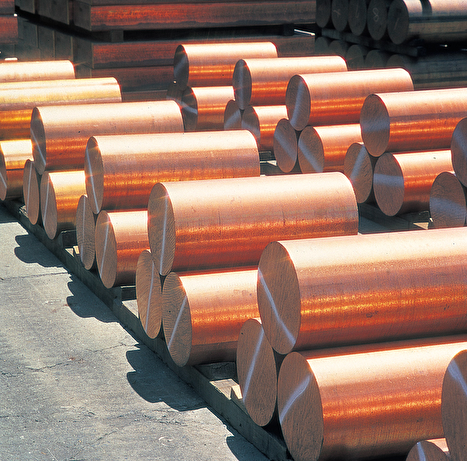Boost Your Workmanship with High-Performance Copper Products for Artisans
Boost Your Workmanship with High-Performance Copper Products for Artisans
Blog Article
Discovering the Diverse Applications of Copper Products in Modern Industries
From boosting the efficiency of electric systems to playing a vital duty in sustainable energy innovations, the convenience of copper is evident. As sectors significantly focus on innovation and sustainability, the diverse applications of copper call for a closer evaluation, especially concerning their possible influence on future environmental practices and technical innovations.
Electric Applications of Copper
Copper is a crucial material in the electrical market, accounting for about 60% of the overall need for non-ferrous metals around the world - Copper Products. Its exceptional electric conductivity, which is almost two times that of aluminum, makes it the recommended choice for a variety of electric applications. From circuitry systems in household and business structures to high-voltage power transmission lines, copper guarantees performance and reliability in electrical power delivery
Along with electrical wiring, copper is important to the manufacturing of electric components such as transformers, generators, and motors. These parts take advantage of copper's thermal conductivity and pliability, necessary for warm dissipation and effective efficiency. Additionally, copper's resistance to corrosion boosts the life-span and sturdiness of electrical systems, making it a cost-effective option in the long term.
The development of renewable resource resources, such as solar and wind power, has additionally enhanced the need for copper in electrical applications. As markets transition towards lasting energy services, copper's function ends up being a lot more important. Generally, the convenience and performance qualities of copper solidify its condition as a keystone product within the electrical field, driving development and performance across various applications.
Pipes and Piping Solutions
In modern pipes systems, the selection of products considerably influences both capability and durability. Copper has actually become a preferred choice because of its one-of-a-kind residential or commercial properties, including deterioration resistance and antimicrobial characteristics. These features guarantee that copper piping continues to be durable and secure for transferring drinkable water, a vital factor to consider in domestic and business applications.
One of the essential benefits of copper in plumbing is its capacity to endure heats and pressures, making it appropriate for a variety of applications, from warm water systems to heating and cooling networks. Furthermore, copper's versatility enables much easier setup in intricate piping formats, lowering the threat of failures and leakages.
One more noteworthy advantage is copper's long life expectancy, usually going beyond half a century with proper maintenance. This durability not only reduces substitute expenses however also adds to lasting techniques by decreasing waste. Copper's recyclability lines up with contemporary ecological requirements, advertising a round economy within the plumbing industry.
Copper in Renewable Resource
The flexibility of copper prolongs past pipes applications, playing a vital duty in the sustainable energy industry. In solar panels, copper is utilized in photovoltaic cells and circuitry, helping with efficient energy conversion and transmission.

In addition, as the international need for electric automobiles (EVs) rises, copper's function in battery systems and billing infrastructure becomes a lot more substantial. The material's capability to carry out electrical power effectively is indispensable to the performance of EV batteries, improving variety and billing speed.
Copper's Duty in Electronic devices
Electronic devices making depends heavily on copper's extraordinary homes, specifically its high electric conductivity and thermal efficiency. These features make copper an optimal option for a vast array of electronic parts, her comment is here including connectors, circuit boards, and circuitry. The metal's ability to effectively transmit electric signals makes certain marginal power loss, which is critical in high-performance electronic gadgets.
Moreover, copper's thermal conductivity plays a significant role in heat dissipation, shielding delicate parts from overheating. This is specifically essential in modern electronic devices, where compact designs result in boosted warm generation. Copper is also favored for its malleability and ductility, enabling it to be easily shaped into complex layouts that satisfy the needs of sophisticated electronic applications.
With the increase of customer electronics, telecoms, and electric vehicles, the need for copper in the electronics market remains to expand. As innovations in modern technology evolve, copper stays integral to accomplishing greater efficiency and dependability in digital products. Its recyclability additionally boosts its appeal, as makers look for lasting options without compromising high quality. Thus, copper remains a foundation product in the ever-expanding area of electronic devices.
Cutting-edge Uses in Production

One notable application remains in additive production, where copper-based products are used in 3D printing processes. This permits the creation of lightweight parts and complicated geometries, specifically in the aerospace and automobile markets. In addition, copper's thermal conductivity makes it an ideal selection for warmth exchangers, improving effectiveness in industrial cooling systems.
In addition, the surge of clever see this here manufacturing has seen the consolidation of copper in IoT tools, where its conductive abilities sustain sophisticated sensing technologies. In the world of eco-friendly energy, copper is critical in the production of photovoltaic panels and wind turbines, promoting much more effective power conversion and circulation.
As industries pursue sustainability and advancement, copper's versatility and efficiency remain to position it as a crucial material, driving advancements in manufacturing and contributing to the advancement of smarter, a lot more reliable products.
Final Thought
The integral role of copper in eco-friendly energy and its necessary feature in electronic devices highlight its importance in progressing lasting techniques. Collectively, these applications highlight copper's vital payment to technical progression and commercial efficiency in contemporary culture.
From boosting the performance of electrical systems to playing a crucial role in eco-friendly energy modern technologies, the adaptability of copper is obvious. As industries increasingly focus on innovation and sustainability, the varied applications of copper call for Visit This Link a closer evaluation, specifically concerning their prospective influence on future environmental methods and technological innovations.
The development of eco-friendly power sources, such as solar and wind power, has further raised the need for copper in electric applications. On the whole, the adaptability and performance features of copper solidify its standing as a keystone product within the electrical market, driving innovation and performance throughout various applications.
The convenience of copper extends beyond plumbing applications, playing an important duty in the renewable energy sector.
Report this page